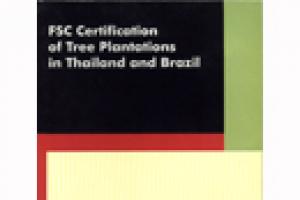In an ironic twist, Thailand’s Community Forest Bill intended as a formal framework to define rights of communities to co-manage forest areas now threatens to resettle rural communities especially ethnic peoples living in the uplands and conservation forest areas.
Thailand
Bulletin articles
12 October 2005
Bulletin articles
27 September 2004
Ms. Mai of the Palaung ethnic community and mother of three children in Pang Daeng village of north Thailand has been camped in front of Chiang Mai City Hall for the past few weeks. Along with about hundred members of her community, she came to petition the Chiang Mai governor for the release of her husband Mr. Tan Bortuk and others.
Bulletin articles
29 July 2004
The March-June edition of the magazine "Watershed" focuses on the issue of tree plantations in Cambodia, Laos, Thailand and Vietnam as part of the broader picture of the spread of industrial tree plantations in the South.
This edition of Watershed is the result of a collaborative effort between a large number of individuals and organizations --mostly from within but also from outside the Mekong region-- concerned over the social and environmental impacts resulting from large-scale tree monocultures.
Other information
3 June 2004
Established in 1989, Advance Agro Public Company Limited is located in Prachinburi province. Its main business is producing and selling pulp and printing and writing paper. The company’s production capacity of bleached kraft pulp is 175,000 tons per year. It also produces bleached short-fibre pulp for two mills operated under Advance Agro Pulp, with a combined capacity of 427,000 tons as well as printing and writing paper, with an annual capacity of 250,000 tons. Along with its subsidiaries (High Tech Paper and Advance Paper), Advance Agro has an annual production capacity of 500,000 tons.
Other information
12 February 2004
Inland aquaculture has been practiced in Asian countries, namely in Indonesia, China, India and Thailand for hundreds of years. Shrimps were traditionally cultivated in paddy fields or in ponds combined with fishes, without significantly altering the mangrove forest, which for centuries has been used communally by local people providing them a number of products such as commercial fish, shrimp, game, timber, honey, fuel, medicine. Women have played a key role in taking the advantage of mangrove resources. In Papua Island, indigenous knowledge regulates woman’s role in mangrove forest.
Other information
13 December 2003
On 28 November-4 December 2003, at Rasi Salai, Thailand, the Thailand-based Assembly of the Poor, USA-based International Rivers Network (IRN), and Southeast Asia Rivers Network (SEARIN) from Thailand, organized the Second International Meeting of Dam Affected People and their Allies, or Rivers for Life!
Bulletin articles
13 December 2003
On 1 December 2003, SmartWood suspended the Forest Stewardship Council certification of two of Forest Industry Organisation’s teak plantations. SmartWood is accredited by FSC to assess whether forestry operations conform to FSC’s principles for well managed forests or plantations.
Publications
8 August 2003
By the World Rainforest Movement
Concern over the spread of tree monocultures and their certification is at the centre of this book. However, this concern is merely one part of much broader concerns concerning forests, forest peoples’ livelihoods and communities of living things.
Bulletin articles
31 July 2003
Two plantations managed by Thailand's Forest Industry Organisation (FIO) are currently certified as well managed under the Forest Stewardship Council system (see WRM Bulletins 48 and 64).
Other information
30 June 2003
Lead mines are killing ethnic communities and contaminating water sources in the Thung Yai Naresuan Wildlife Sanctuary complex, a World Heritage site, in eastern Thailand.
Bulletin articles
3 May 2003
Advance Agro, one of Thailand's largest pulp and paper companies, markets its "Double A" brand paper as environmentally friendly. The company's advertising explains that the raw material comes from plantations and thus relieves pressure on remaining forest areas.
Bulletin articles
4 March 2003
The purpose of British colonial forestry in the nineteenth century was to ensure that the colonial state maintained control over the forests in order to ensure a steady supply of timber. The imprint of colonial forestry in the Mekong Region is still felt today, as states continue to wrest control of forests from local communities.

